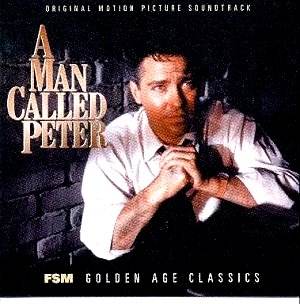Alfred NEWMAN
A Man Called Peter  OST
OST  FILM SCORE
MONTHLY Vol 4 No. 7 [58:10]
FILM SCORE
MONTHLY Vol 4 No. 7 [58:10]
[Available through the magazine, Film Score Monthly, or its website
(www.filmscoremonthly.com)
for $19:95 plus shipping: Film Score Monthly, 8503 Washington
Boulevard, Culver City CA 90232, ph: 310-253-9595 or toll-free
1-888-345-6335 fax:310-253-9588; Lukas@filmscoremonthly.com]

A solid example from Alfred Newman of film scoring
from the 1950s, here supporting the true story of Peter Marshall,
who became Chaplain to the United States Senate. Quite naturally,
considering the subject matter, there is a religious grandeur
and reverence to this score, but it manages not to slide too far
into extreme sentimentality (for the most part) and has a real
sense of both compassion and dignity.
There are three central themes to this work,
the first two introduced in the 'Main Title', beginning with a
noble, benevolent string led piece with a Scottish folksy flavour
(the story opens in that country) representing the title character,
while a second melody to characterise America, the land of opportunity,
has a typically righteous quality that was often heard in US movies
of this era. The other key motif is introduced in 'Catherine',
the woman who became Peter's wife and this sweet-natured romantic
piece figures prominently, on among others, 'One Week Later' with
a rather tragic tone and the uplifting 'Faith and Recovery'. At
other times it works in harmony with Peter's own theme, the two
motifs used to depict their blossoming romance ('Goodnight, Peter
Darling', 'The Proposal/The Cedars Waltz/The Way of Love') and
later to augment the more dramatic, poignant aspects of the story
on 'Finale'. But while these two pieces are quite rewarding, I
had less enthusiasm for the 'America' theme which is reworked
on many cues like 'The Immigrant', 'Washington, D.C.', 'The Lincoln
Memorial' and 'The Church of the Presidents'. For my taste this
is a little too melodramatic and naive, a criticism that some
more modern-minded film music aficionados might level at certain
examples in Newman's considerable body of work. Even so, there
are tracks that compensate, particularly 'The Revelation', with
that attractively Scottish folk sound (incorporating Peter's theme
once more), building mysteriously towards a 'heavenly' finale.
There are also a number of pleasant source cues, something which
normally I find rather distracting, but here they seem integral
to the overall score. 'The Bonnie Banks of Loch Lomond', 'That
Old Time Religion' and 'God the Father' among many others, all
contribute to capturing the essence of this story.
This is a nostalgic film score, representing
a musical era when charm and a certain innocence were more prevalent
and if the music seems somewhat unsophisticated by today's standards
that is to be expected. But a score like this has its place and
it can only be a good thing that it's now generally available,
thanks once more to the first rate efforts of the Film Score Monthly
team.
Mark Hockley

